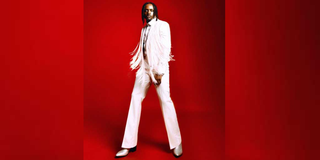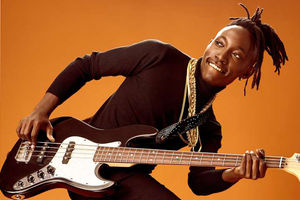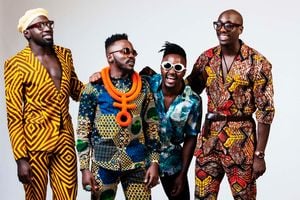
Savara’s journey from Sauti Sol to a thriving solo career has been one of self-discovery, creative freedom, and growth.
Delvin Mudigi aka Savara is a producer, songwriter and drummer. He has just released his second album entitled 'No Overthinking'. He spoke to us about his solo journey away from Sauti Sol.
How has your journey as a solo artist been so far?
Being in a group has its own dynamic - you share ideas and not everyone has to agree. In Sauti Sol we had a household sound and we've been doing that for a while. But as a solo artist I've had the freedom to experiment.
For example, I've always wanted to incorporate elements like a drum pad and a DJ deck into my live sets. These are things I couldn't fully explore in a group because you have to consider everyone else's input. Working solo allows me to do something extreme, try out new ideas and develop my brand independently.
To answer the big question on everyone's mind: Why did Sauti Sol decide to take a break?
The decision was driven by personal growth and creative exploration. After so many years together, it's important to allow ourselves to grow individually. When you're in a group for so long, certain aspects of your individuality can be overlooked. We all needed time to rediscover ourselves, experiment and come back with fresh perspectives.
When you take a break, your fans miss you, and when you reunite, there's renewed energy and excitement. But we've also been through a lot as a group - emotionally and psychologically. Therapy and life coaching have helped us through this transition. This break is not the end; it's a chapter for growth.
How has the decision affected you personally?
It's been an eye-opener. I've learnt so much about my strengths and weaknesses - things I wouldn't have discovered within the group dynamic. For example, I've found a deeper appreciation for my creative process and how I approach production. As a group, you compromise a lot for the collective vision. Working solo has allowed me to explore ideas I've always wanted to try.
How many songs have you produced as a solo artist?
In May I released an EP, No Overthinking, with eight tracks. I produced all of them, with some help from other producers. I also did a writing camp where we produced ten songs. The first one from that camp, 'Show You Off', has already been released and nine more are waiting. This year I've been concentrating on branding and putting my projects together.
"Show You Off" is a hit. Can you tell us about the inspiration behind it?
We were writing two songs a day at the camp. One morning I was thinking about French Kompa music, a globally significant sound, and wondered how I could adapt it. I wanted to make it a love song, celebratory, like something you'd hear at a wedding or engagement party. That's how Show You Off was born - it's about celebrating love and commitment.
As a solo artist, how would you classify your music genre?
Honestly, I don't like to pigeonhole myself. I've done kompa, amapiano, afrobeat, acoustic and even singer-songwriter styles. I call my music "Savara to the World" because it's about taking our cultures and exporting them. For example, I've sampled traditional Luhya sounds in Afrobeat songs. It's about fusing global influences with my Kenyan roots.
Your music often explores deep emotional themes. How do you balance vulnerability with entertainment?
You have to be honest with yourself. Sometimes I write in a deeply emotional state, but later I reflect and realise it's too vulnerable. That's when I add a positive angle, some humour or an entertaining twist. Songwriting is a process and over time you learn to balance those elements effortlessly.
You've talked about finding peace in self-expression. How has that affected your perspective on fame and personal identity?
Over the years I've made mistakes - sometimes out of pride or naivety. But introspection and surrounding yourself with good people is crucial. Fame can get to you, but it's important to have people who keep you grounded and honest about your energy. Experience has taught me how to handle fame better while staying true to myself.
What challenges have you faced in staying relevant as a solo artist?
As a solo artist, you're building a foundation from the ground up. The fame you had as part of a group doesn't automatically carry over. You have to remind yourself to work hard, go to the studio every day and stay consistent. It's a chance to rediscover yourself and live your musical life again.
What keeps you awake at night as a musician today?
Lately I've been learning to play the guitar with the help of a music teacher at the Kenya Conservatory of Music. It's therapeutic and helps me relieve stress. Learning something new keeps me creative and pushes me to explore different aspects of music.
Fashion plays a role in your brand. How do you approach your style?
Fashion is a big part of my image. In today's world, especially with platforms like TikTok, people consume both visual and auditory content. Fashion is an art form, just like music. It's a way of expressing your journey and your emotions. My stylist, Yvonne, helps me with my aesthetic. And yes, I've embraced my natural grey hair, which I started getting at the age of 25 - it's become part of my identity.
Apart from music, what has been your most rewarding financial investment?
My health. I'm into fitness and wellness, although I'm not an extremist. I've also spent on gym memberships and healthy food; investments in myself.
What legacy would you like to leave in Kenyan music?
I would like to be remembered as someone who brought spirituality and tradition into music. Kenyan culture and traditions are rich and I want to highlight that in my work. I want to influence people to appreciate and embrace their roots.

Savara is focused on releasing more music, with plans to release new tracks every four weeks.
What is the biggest lesson you've learnt in 2024?
Fear is your biggest obstacle. Just start. And that's something I'll take with me.
What advice would you give to aspiring artists?
There's no formula in this industry. It takes hard work, consistency and branding. Use social media to your advantage, engage with your fans and stay true to your craft. Luck plays a part, but you have to put in the effort to create opportunities for yourself.
Finally, what's next for you?
More music. I plan on releasing new tracks every four weeks. It's an exciting time and I'm ready to share more of my journey with the world.











